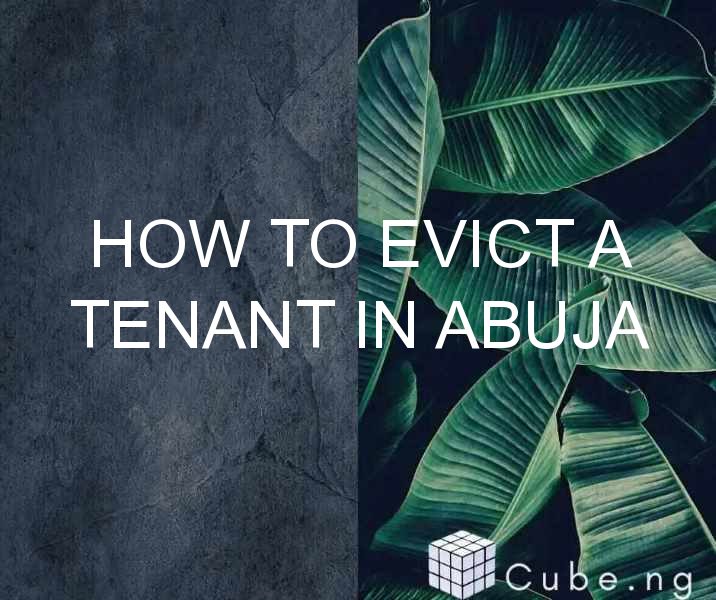Table of Contents
How to Evict a Tenant in Abuja: A Comprehensive Guide
Being a landlord is not always a bed of roses, especially when it comes to evicting a tenant who is unwilling to vacate your property. Evictions can be stressful, time-consuming, and complicated, particularly in Abuja, where the legal framework governing such matters can be a bit intricate.
If you find yourself in a situation where you need to evict your tenant in Abuja, there are certain steps you need to follow to ensure that the process is carried out legally and without any hitches. In this article, we will take you through the essential steps you need to take to evict a tenant in Abuja effectively.
Understanding the Legal Framework
Before you take any action to evict your tenant, it is essential to understand the legal framework governing the eviction process in Abuja. This will help you avoid any legal pitfalls that may arise from your actions.
The landlord and tenant relationship in Abuja is governed by the Tenancy Law of 2019, which provides a framework for the rights and obligations of landlords and tenants. The law stipulates the following requirements for landlords to legally evict a tenant:
-
The landlord must give the tenant a notice to quit, which should specify the reason(s) for the eviction and the date by which the tenant should vacate the property. The notice should be given in writing and delivered to the tenant in person or by post.
-
If the tenant fails to vacate the property after the expiration of the notice to quit, the landlord can apply to the Rent Control and Recovery of Residential Premises Tribunal for an Order of Possession.
Giving the Tenant a Notice to Quit
The first step in evicting a tenant in Abuja is giving them a notice to quit. This notice should be given in writing and specify the grounds for the eviction and the date by which the tenant should vacate the property.
The notice should be delivered to the tenant in person or by post. If the tenant is not available to receive the notice, the landlord can attach the notice to the door of the property or leave it with a person who appears to be over the age of 18 and residing in the property.
Applying for an Order of Possession
If the tenant fails to vacate the property after the expiration of the notice to quit, the landlord can apply to the Rent Control and Recovery of Residential Premises Tribunal for an Order of Possession.
The application should be made on Form G of the Rent Control and Recovery of Residential Premises Tribunal Rules, which should be accompanied by the following documents:
- A copy of the notice to quit
- A copy of the tenancy agreement
- Proof of service of the notice to quit
- Any other relevant documents or evidence to support the application
Once the application is received, the Tribunal will fix a date for the hearing and serve the tenant with a notice of the hearing. The tenant will have an opportunity to respond to the application and present their case before the Tribunal.
If the Tribunal is satisfied that the grounds for eviction are valid, it will issue an Order of Possession directing the tenant to vacate the property within a specified period.
Enforcing the Order of Possession
If the tenant still refuses to vacate the property after the expiration of the Order of Possession, the landlord can enforce the order by seeking the assistance of the police or a bailiff. The police or bailiff will then evict the tenant and remove their belongings from the property.
It is essential to note that the landlord should not use force to evict the tenant, as this is illegal and can result in legal action being taken against them.
Concluding Thoughts
Evicting a tenant in Abuja can be a daunting task, but it is a necessary one if the tenant is in breach of their tenancy agreement or causing damage to the property. By following the legal framework and taking the necessary steps, you can ensure that the eviction process is carried out legally and without any hitches.
Remember to always act within the confines of the law and seek legal advice if you are unsure of any aspect of the eviction process.
FAQ
-
Can a landlord evict a tenant without a valid reason?
No, a landlord can only evict a tenant for valid reasons specified in the Tenancy Law of 2019. -
How long does a notice to quit last?
The notice to quit should specify the period within which the tenant should vacate the property, which could be anything from 7 to 30 days. -
Can a tenant challenge an Order of Possession?
Yes, a tenant can challenge an Order of Possession by presenting their case before the Rent Control and Recovery of Residential Premises Tribunal. -
Can a landlord evict a tenant without a court order?
No, a landlord can only evict a tenant with a court order issued by the Rent Control and Recovery of Residential Premises Tribunal. -
What should a landlord do if a tenant refuses to vacate the property after the expiration of the Order of Possession?
The landlord should seek the assistance of the police or a bailiff to enforce the Order of Possession and evict the tenant.




